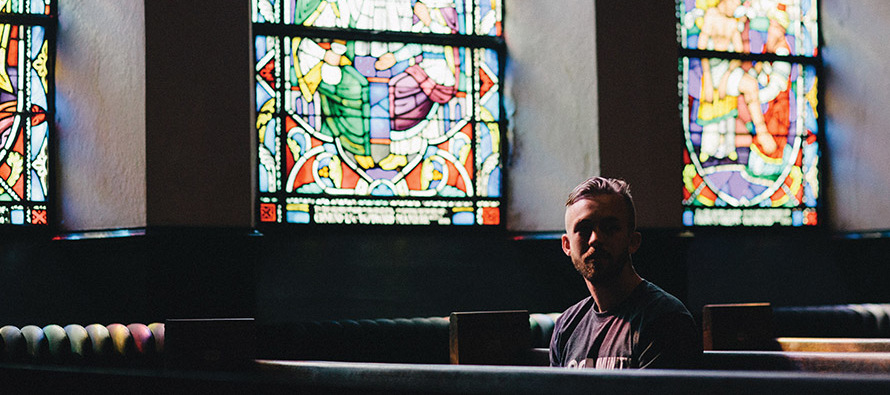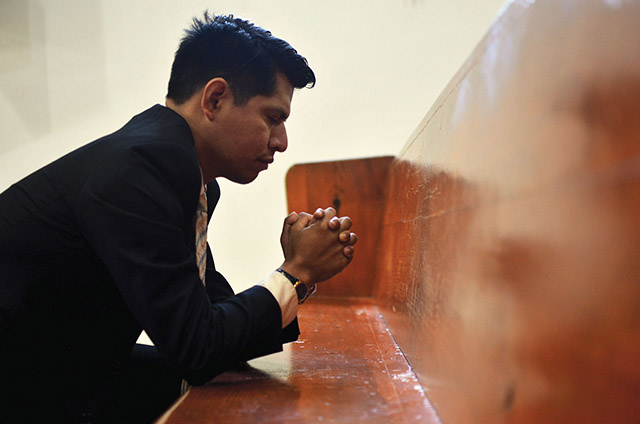8 questions and answers to your prayers

Every person’s path toward a deeper understanding of prayer is unique, but no matter where you are on that path, it never hurts to revisit the prayer foundations presented in the Catechism of the Catholic Church. (Photo by Karl Fredrickson on Unsplash.)
PRAYER IS DEEPLY PERSONAL. How you pray, what you pray about, where prayer takes you—these are unique to every individual. Every person’s path toward a deeper understanding of prayer is also unique, but no matter where you are on that path, it never hurts to revisit the prayer foundations presented in the Catechism of the Catholic Church (CCC).
Following are basic questions about prayer with answers directly from the catechism. Find the full catechism, with its 75 pages on prayer, on the USCCB website under “Beliefs and Teachings/What We Believe.”
1) What is prayer?
Prayer is God’s gift. Saint Thérèse of Lisieux, a 19th-century Carmelite nun who dedicated her life to prayer, says of it:
For me, prayer is a surge of the heart;
it is a simple look turned toward heaven,
it is a cry of recognition and of love,
embracing both trial and joy (CCC 2558).
Saint John Damascene, an eighth-century monk and doctor of the church, defines it in this way, “Prayer is the raising of one’s mind and heart to God or the requesting of good things from God” (CCC 2559).
2) What spirit or attitude can help me in prayer?
“Humility is the foundation of prayer. Only when we humbly acknowledge that ‘we do not know how to pray as we ought,’ (Romans 8:26) are we ready to receive freely the gift of prayer. ‘Man is a beggar before God,’ said Saint Augustine” (CCC 2559), a fifth-century bishop and doctor of the church.
3) Am I the one who initiates prayer?
Not exactly; God is always seeking us and awaiting us: “Whether we realize it or not, prayer is the encounter of God’s thirst with ours. God thirsts that we may thirst for him” (CCC 2560).

4) Where does prayer come from?
While prayer may be expressed in both words and gestures, it emanates from the heart:
According to Scripture, it is the heart that prays. If our heart is far from God, the words of prayer are in vain. The heart is the dwelling-place where I am, where I live; according to the Semitic or Biblical expression, the heart is the place “to which I withdraw.”
The heart is our hidden center, beyond the grasp of our reason and of others; only the Spirit of God can fathom the human heart and know it fully. The heart is the place of decision, deeper than our psychic drives. It is the place of truth, where we choose life or death. It is the place of encounter, because as image of God we live in relation: it is the place of covenant. (CCC 2562-2563)
5) What are some truths about prayer that Jesus teaches?
The catechism devotes many pages to what we can learn about prayer from Jesus’ words and actions—more than can be covered in this short article—but here are four truths it conveys from what Jesus taught.
• Prayer involves conversion of heart:
From the Sermon on the Mount onwards, Jesus insists on conversion of heart: reconciliation with one’s brother before presenting an offering on the altar, love of enemies, and prayer for persecutors, prayer to the Father in secret, not heaping up empty phrases, prayerful forgiveness from the depths of the heart, purity of heart, and seeking the Kingdom before all else (CCC 2608).
• Prayer rests upon faith:
Faith is a filial adherence to God beyond what we feel and understand. It is possible because the beloved Son gives us access to the Father. He can ask us to “seek” and to “knock,” since he himself is the door and the way.
Just as Jesus prays to the Father and gives thanks before receiving his gifts, so he teaches us filial boldness: “Whatever you ask in prayer, believe that you receive it, and you will.” Such is the power of prayer and of faith that does not doubt: “all things are possible to him who believes” (CCC 2609-10).
• Prayer means being ready to act:
The prayer of faith consists not only in saying “Lord, Lord,” but in disposing the heart to do the will of the Father. Jesus calls his disciples to bring into their prayer this concern for cooperating with the divine plan (CCC 2611).
• Prayer requires watchfulness:
In Jesus “the Kingdom of God is at hand.” He calls his hearers to conversion and faith, but also to watchfulness. In prayer the disciple keeps watch, attentive to Him Who Is and Him Who Comes, in memory of his first coming in the lowliness of the flesh, and in the hope of his second coming in glory (CCC 2612).

6) Can meditation be part of my prayer life?
Meditation, that is, reflection on scripture or spiritual writing, can be a helpful form of prayer (CCC 2705-2708):
Meditation is above all a quest. The mind seeks to understand the why and how of the Christian life, in order to adhere and respond to what the Lord is asking. The required attentiveness is difficult to sustain. We are usually helped by books, and Christians do not want for them: the Sacred Scriptures, particularly the Gospels, holy icons, liturgical texts of the day or season, writings of the spiritual fathers, works of spirituality, the great book of creation, and that of history, the page on which the “today” of God is written. (CCC 2705)
To meditate on what we read helps us to make it our own by confronting it with ourselves. Here, another book is opened: the book of life. We pass from thoughts to reality. To the extent that we are humble and faithful, we discover in meditation the movements that stir the heart and we are able to discern them. It is a question of acting truthfully in order to come into the light: “Lord, what do you want me to do?”
7) What other expressions or forms does prayer take?
Prayer usually has three types of expression: vocal prayer, that is, prayer put into words either spoken aloud or in one’s heart, meditation, described above, or contemplative prayer, “a gaze of faith fixed on Jesus” and experienced in silence (CCC 2700-2708).
Forms of prayer (CCC 2626-2638) are many and varied, and they include:
• Blessing: “We bless God for having blessed us.”
• Adoration: This prayer “exalts the greatness of the Lord who made us.”
• Prayer of petition: We request something of God. “When we share in God’s saving love, we understand that every need can become the object of petition.”
• Prayer of intercession: We pray on behalf of another. “In intercession, he who prays looks ‘not only to his own interests, but also to the interests of others,’ even to the point of prayer for those who do him harm.”
• Prayer of thanksgiving: “As in the prayer of petition, every event and need can become an offering of thanksgiving.”
• Prayer of praise: “Praise is the form of prayer which recognizes most immediately that God is God. It lauds God for his own sake and gives him glory, quite beyond what he does, but simply because he is.”
8) What does it mean to “pray at all times”?
Saint Paul encouraged the early Christians to “pray without ceasing” (1 Thess. 5:17). The church fully embraces this idea:
Prayer in the events of each day and each moment is one of the secrets of the kingdom revealed to “little children,” to the servants of Christ, to the poor of the Beatitudes. It is right and good to pray so that the coming of the kingdom of justice and peace may influence the march of history, but it is just as important to bring the help of prayer into humble, everyday situations; all forms of prayer can be the leaven to which the Lord compares the kingdom. (CCC 2660)
May your own journey in prayer, in whatever shape or form it takes, be a leaven in your life, lifting you closer each day to our loving God.
Related articles: VocationNetwork.org, “A user’s guide on the ways to pray” and “Pray always.”
Tags
Related
- Questions Catholics Ask: What are the different forms of prayer?
- What does “success” look like in discernment?
- How to find a guide for your vocation adventure
- Beware of bots and bad actors as you engage online
- Call stories to help you discern
- Five reasons to pray the Liturgy of the Hours
- Tune into your prayer life
- Embody your decisions
- Your mission awaits you! Pope Francis' message to young people
- My portable prayer life Read More
Most Viewed
- Find your spirituality type quiz
- Questions and answers about religious vocations
- Celibacy quiz: Could I be a nun? Could I be a brother? Could I be a priest?
- Resources for older discerners or those with physical and developmental differences
- About Vocation Network and VISION Guide


